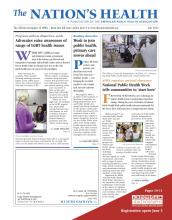APHA: Determine effects of pipeline
APHA is calling on the U.S. Department of State to examine the health effects of the proposed Keystone XL pipeline, an oil pipeline that would run thousands of miles from Canada to the coast of Texas.
In an April letter to Secretary of State John Kerry, APHA and the National Association of County and City Health Officials lent their support to a request from Sens. Barbara Boxer, D-Calif., and Sheldon Whitehouse, D-R.I., to conduct a comprehensive study of the pipeline’s possible health impacts. The letter noted that both groups support the consideration of health in all decision-making.
“The full spectrum of health considerations are often overlooked in important decisions and their omission can lead to policies and practices that are unnecessarily harmful to public health,” the letter stated.
Infants benefit from being held as early as possible
Allowing mothers to hold infants immediately after birth — before the umbilical cord is clamped — could lead to a significant reduction in iron deficiency in infancy.
A study published April 16 in The Lancet compared the blood volume that had transferred from placenta to child in the moments after birth between two groups of infants. Some of the babies were immediately placed on their mothers’ abdomen or chest, and others were placed in the recommended introitus position, which is at the same level as the placenta, for two minutes after birth. The study found no statistically significant difference in blood volume transferred between the groups. The researchers noted that the recommended introitus position is cumbersome and interferes with immediate contact between mother and child.
Previous studies have found that delaying umbilical cord clamping for about two minutes after birth reduces the risk of iron deficiency in infants. Noting that iron deficiency in newborns “is a serious public health problem in low-income countries” that also is prevalent in North America and Europe, study lead author Nestor Vain, MD, of the Foundation for Maternal and Child Health in Buenos Aires, Argentina, said immediately placing babies on their mothers’ chest or abdomen “should be strongly recommended.”
- Copyright The Nation’s Health, American Public Health Association









